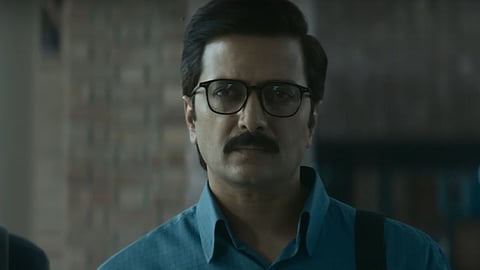Pill Series Review: A sincere Riteish Deshmukh in a monotonous medical-drama
Pill(2 / 5)
Stories featuring an individual striding against the tenets of power have been a centrepiece of Hindi cinema for a long time. Beginning from the 1970s, Salim-Javed’s seminal creation Zanjeer (1973), led the way in telling the stories of an idealistic protagonist functioning in a cynical world. The over-the-top image of an angry young man has taken different forms in films over the years, like in Sunny Deol’s rage-infused Damini (1993), Anil Kapoor’s social-drama Nayak: The Real Hero (2001), and Akshay Kumar’s vigilante actioner Gabbar Is Back (2015). Pill operates in similar terrain, carrying the tiring energy of the triumph of ‘good vs evil’ while imposing a critical eye on the pharmaceutical industry.
Director: Raj Kumar Gupta
Cast: Riteish Deshmukh, Pavan Malhotra, Neha Saraf, Akshat Chauhan, Anshul Chauhan
Streamer: JioCinema
The problem with this genre is that the plot points are pretty straightforward. A seemingly powerless individual realises a pressing problem in the state-of-affairs and decides to take on a fight. Along the way, as troubles increase for our David, he is consumed entirely in the strife that poses a threat to his personal life. Finally, when there is absolutely zero possibility of winning, he plays the final move and defeats Goliath, preceded by an emotional monologue. The David here is Prakash Chauhan (Riteish Deshmukh), a bespectacled doctor who is transferred to the Medicinal Authority of India in order to conduct inspections in pharma factories and test the safety of their drugs. He is joined by the no-nonsense medicine inspector Gursimrat Kaur (Anshul Chauhan), who takes her Royal Enfield each day to work and silences the smirks of middle-aged women with her swag. Together with a novice journalist, Noor Khan (Akshat Chauhan) working for a makeshift entertainment newspaper, the three of them take on business tycoon Brahma Gill (Pavan Malhotra). His corrupt company, Forever Cure Pharma, manipulates clinical trials of drugs and conducts illegal and unauthorised tests on people, permanently damaging their vital organs.
The show’s motive is crystal clear: ‘expose’ the dark side of the medicine industry and the state’s complicity in siding with crony capitalists. The concern is alarmingly real, but the way it is portrayed makes it seem more like a fear-mongering device. There is a serious lack of nuance in crafting the characters. The Pharma guys are shown as apathetic monsters, manufacturing drugs with the only aim of minting more money. At one point, Prakash does a lab testing of some of the medicines made by the company and concludes that none of the drugs have the desired amount of chemicals needed to resolve the said disease. There is a general sentiment that all drugs are adulterated and their usage will always be fatal. By doing so, facts don’t just remain facts but become half-truths as the genre filmmaking demands to sensationalise reality. As a result, Pill seems to create an aura of disbelief towards the entire science-based medicine, by building on the narrative of adulterated drugs.
At the centre of this quest of ‘saving lives’, is the soft and powerful presence of Riteish Deshmukh, making his web-series debut. It is especially refreshing to see him in a serious role as he navigates a complex web of issues through his introverted and Amol Palekar-esque middle-class demeanour. There is a rare control in his performance that doesn’t mount itself atop a bunch of dramatic emotions. On the other hand, Pavan Malhotra is slightly disappointing as the business tycoon whose only way of dealing with conflict is raising his voice. Akshat Chauhan is likeable and brings in timely humour in his scenes, while Anshul Chauhan adds up to the show’s intensity with a promising flair in her sturdy appeal.
Created by Raj Kumar Gupta, Pill doesn’t rise away from the pre-established genre tropes and pitfalls into a plethora of undercooked ideas. It takes its issue too seriously while letting the storytelling go flat. Such a story has an inherent sense of relatability as it combines a collective angst against the system and gives it a dramatic release. Here, however, it is the lack of reinvention in the genre that leads to its monotonous downfall. There is no magic pill to cure a cliché.

